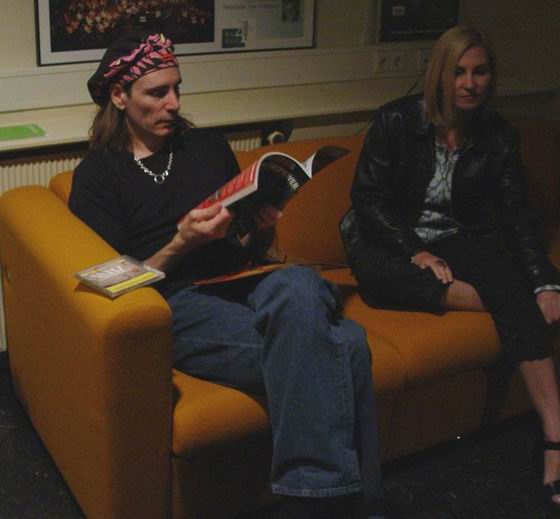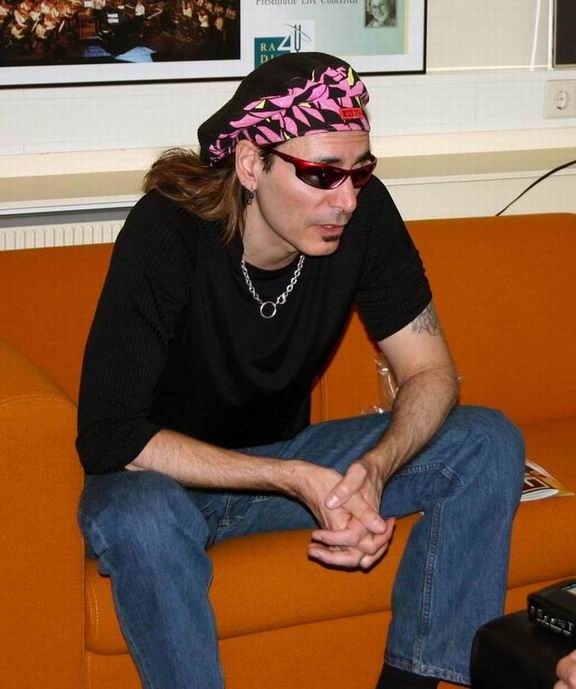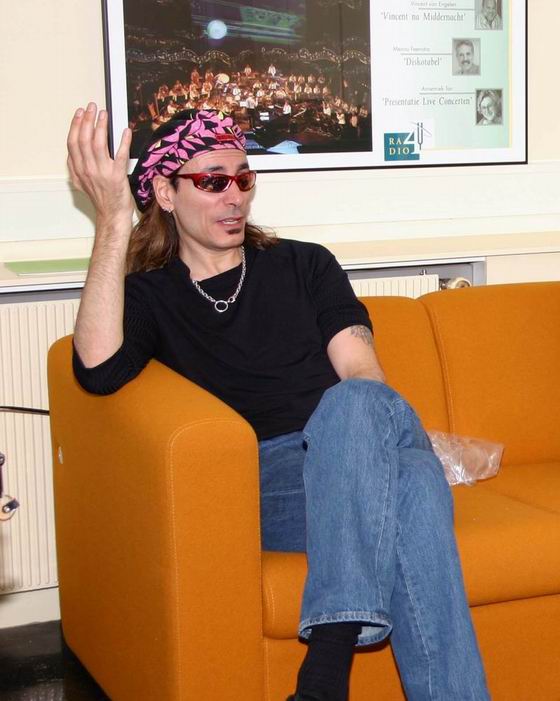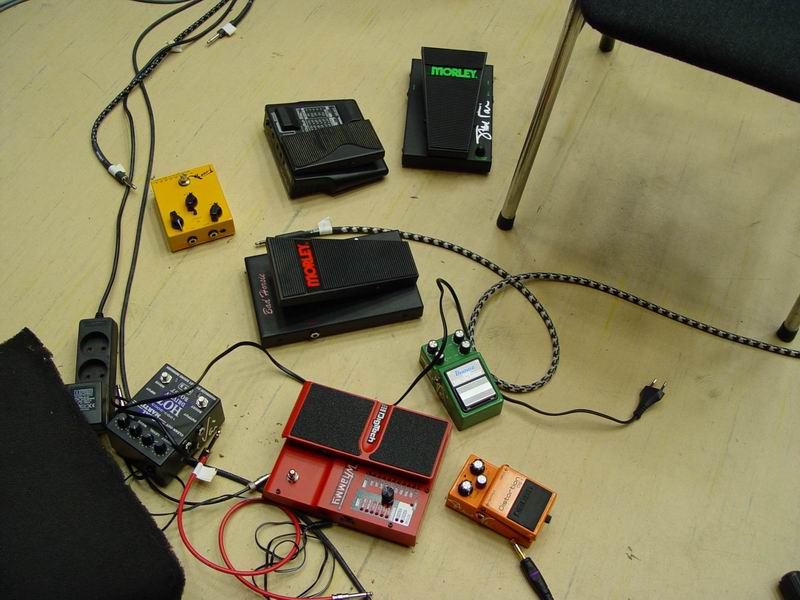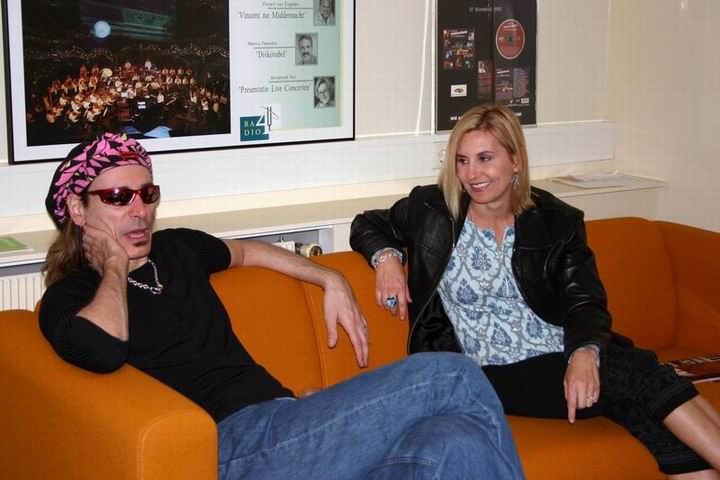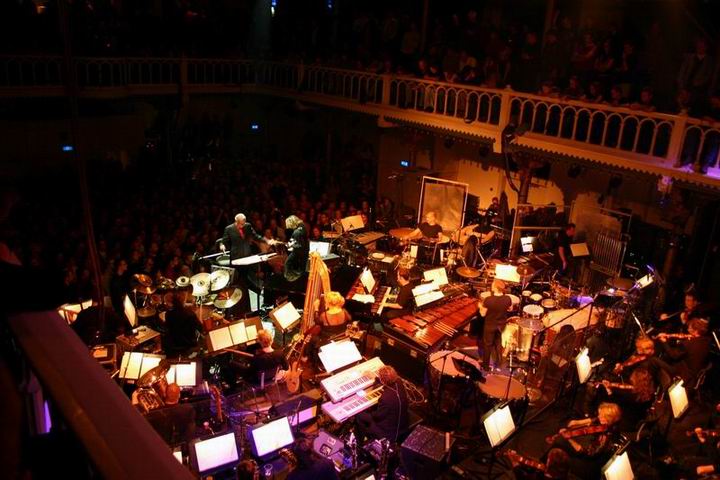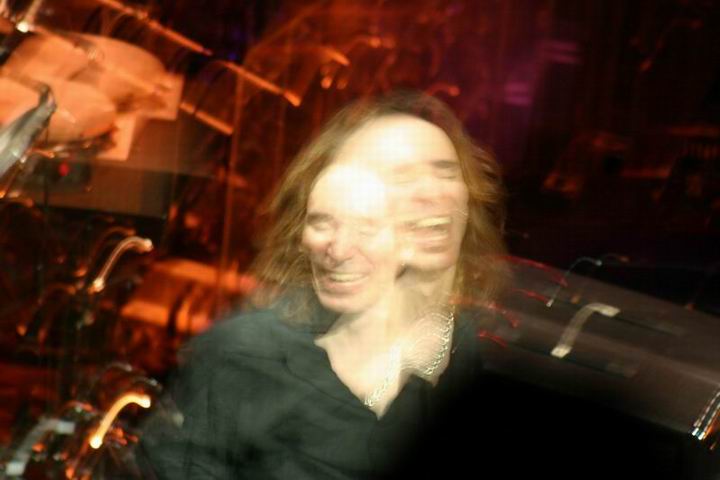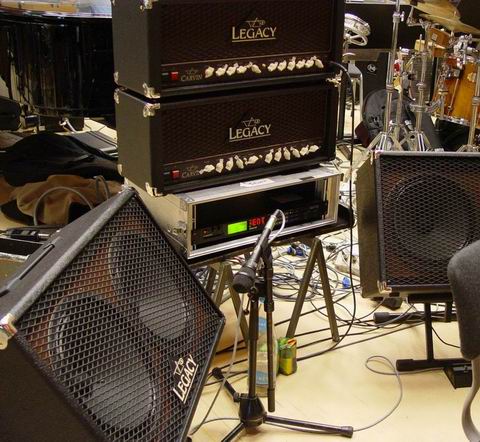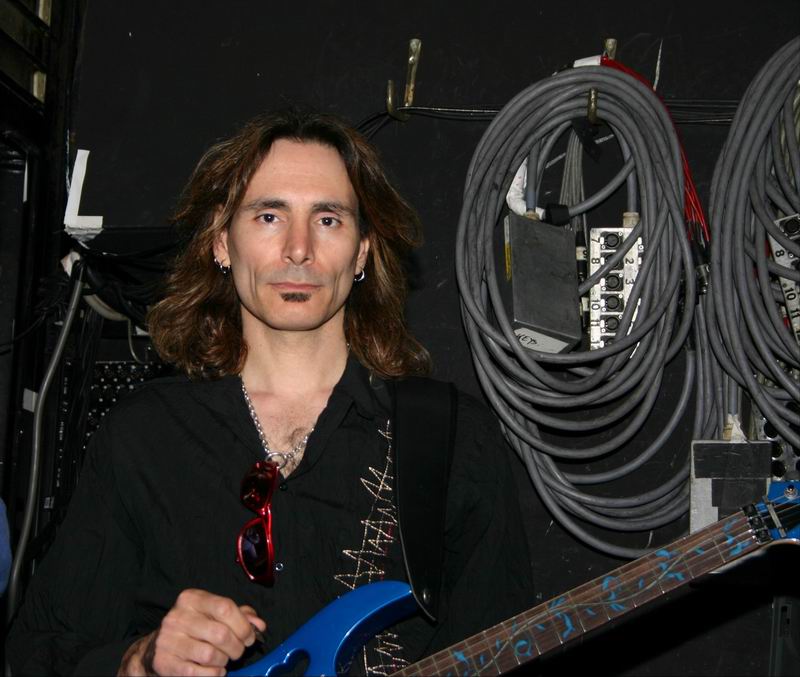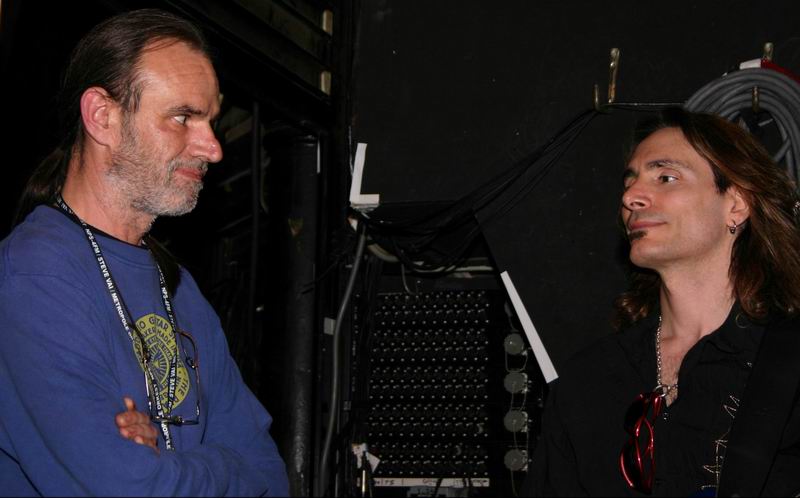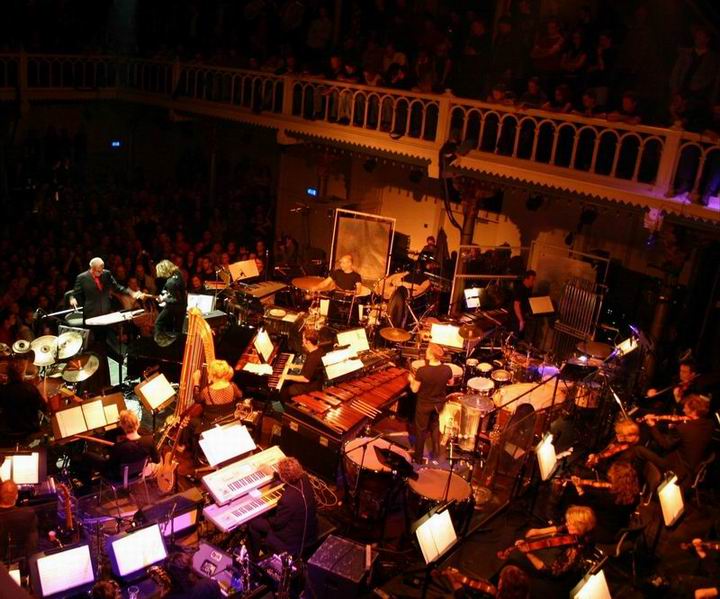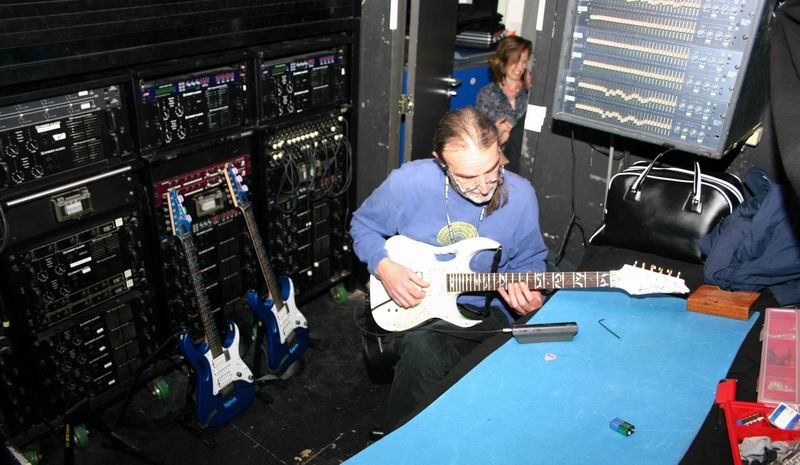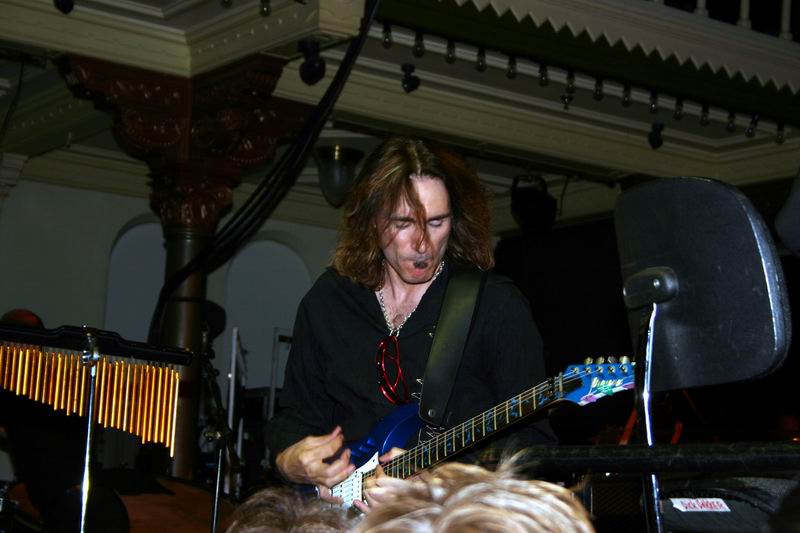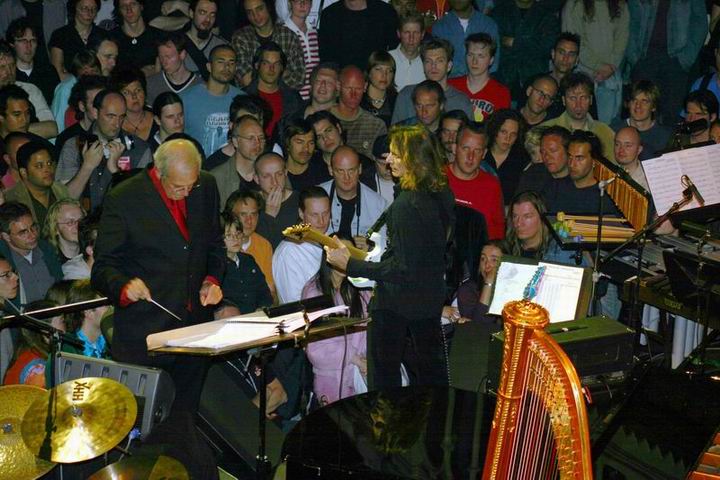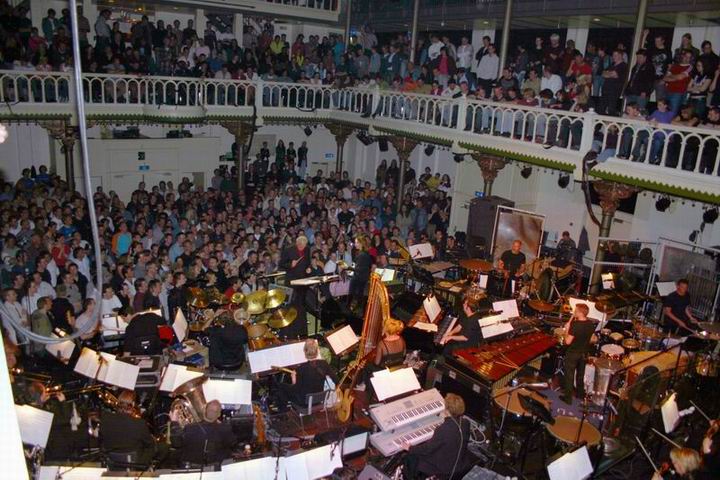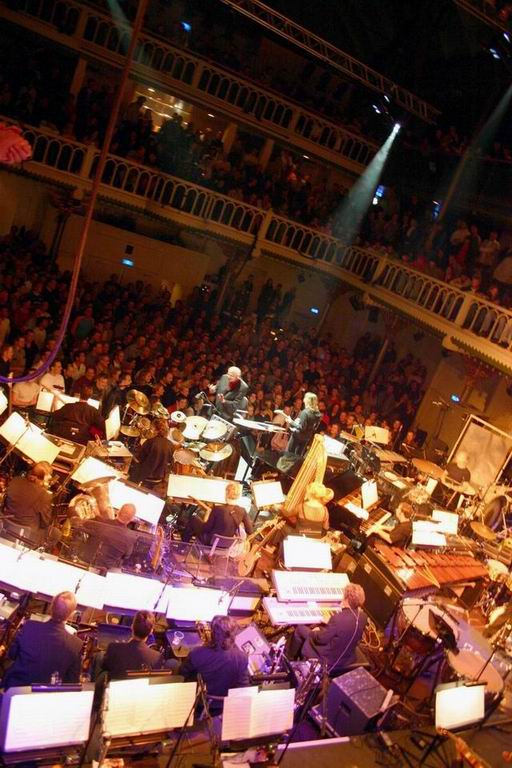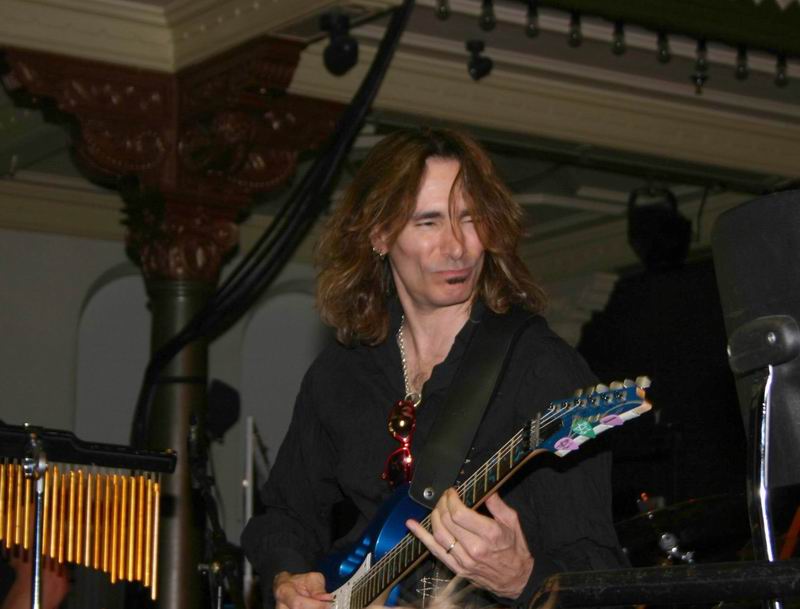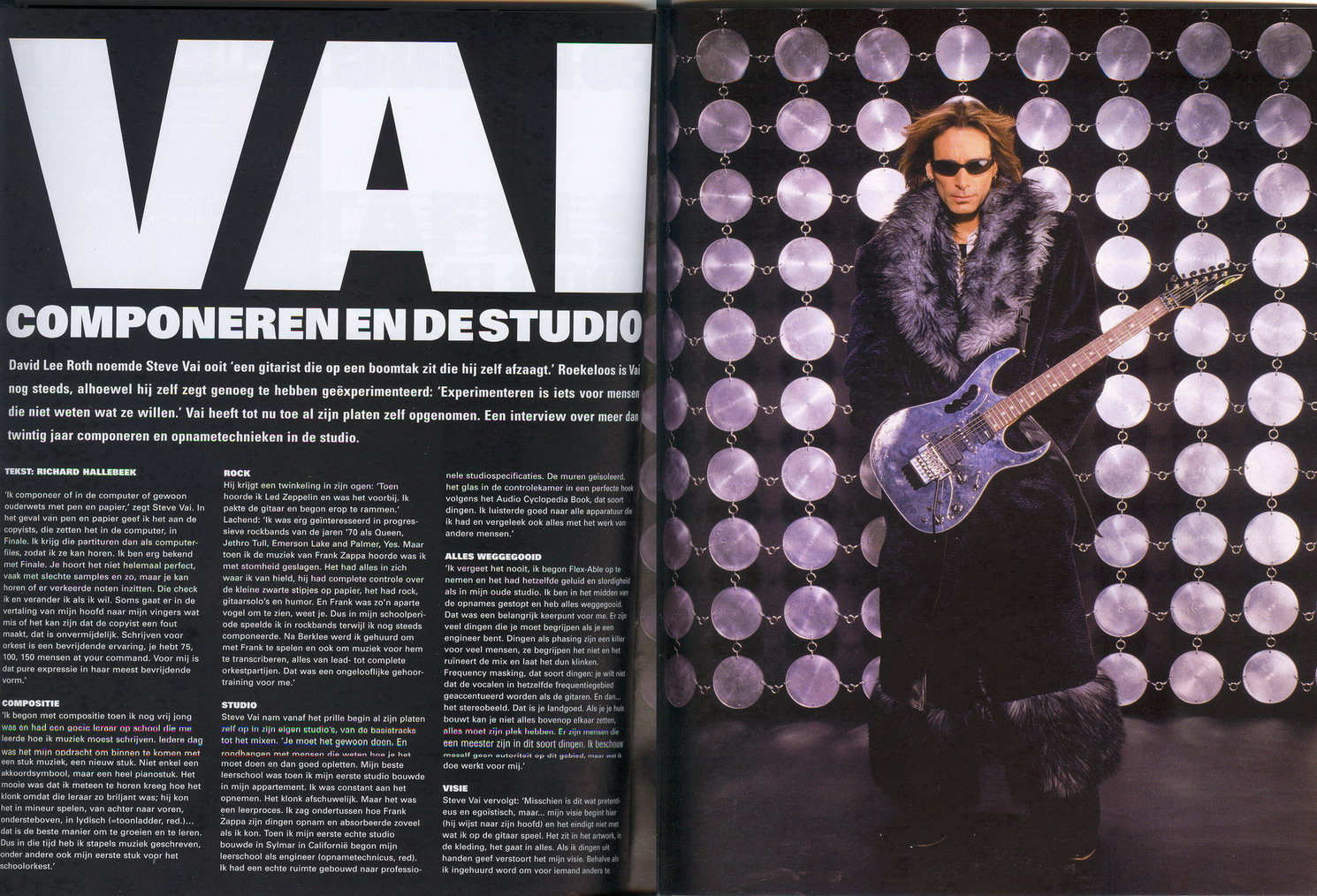Steve Vai performed his piece ‘The Aching Hunger’ last may 2003 in Amsterdam, Paradiso with the Metropole Orchestra. This interview took place may 21th 2004 in Hilversum at the Metropole rehearsal building, NOB studios. The guitar player in the Metropole is my former teacher and he had mentioned RHP to Steve, so this conversation actually began with Steve asking me some questions. Steve’s wife Pia was sitting next to him during the interview. This interview plus some extras will be printed in the upcoming issue of Guitar Magazine.
:: Copyright Richard Hallebeek and Guitar Magazine 2005. Copying or use elsewhere without the clear approval of the author is strictly prohibited.::
Photo’s by Richard Hallebeek. Copyright 2005 Guitar Magazine
(Vai)I heard you played and recorded with Shawn Lane, but did he pass away? What happened exactly to him?
:: Some lung complication from what I’ve understood.
‘How old was he?’
:: 40.
(Pia) ‘wow’ (Steve) What’s the album you did together?
:: It’s called RHP, we got a great band there, Lale Larson on keys, Brett Garsed is playing there too. Let me give you the album..
Thanks. Oh yeah, Brett’s great. He might play on my upcoming Australian tour, too. That’s a cool cover you got there. I will check this cd out tonight in my hotelroom.
:: The piece you’re performing with the orchestra is called ‘The Aching Hunger’, let’s start off with that; does it have to do anything with the same titles piece on Fire Garden?
‘At one point it did. See, the musical director Co De Kloet (organizer-from Dutch NPS) he has been a friend of mine for many years. As a matter of fact, he is the first one that bought Flexable from me for Europe. That’s how far back we go. We’ve followed each other’s careers and Co worked into NPS and was artistic enough to start creating these concerts with the Metropole Orchestra. He talked to me about doing this about two years ago.’
:: Right, Mike Keneally was up a while ago.
‘Yeah. And the concept in the beginning was to create like a little musical you know, with a couple of actors. That was called ‘The Aching Hunger’. But then, with time constraints being what they are for a project like this, the concept changed a bit. So the original idea of The Aching Hunger has kind of been altered. But it’s still a good name for the project.’
:: Does it have to do anything with the themes from the Fire Garden piece?
‘No, not at this point.’
:: Can you tell me about composing this piece? You did the whole thing in a pretty short period?
‘Well, actually.. the first several pieces were I’m not performing and I’m just listening (laughs) I actually composed those many years ago, like 24 years ago. When I was a young man living in Hollywood. And I’ve had them around and through the years I’ve done a lot of orchestration, but it’s just so.. difficult to get your music performed with an orchestra, because of the costs. And you know, there’s.. discriminations, being a rock guitar player. Getting into that little circle of the orchestra is very difficult. That’s why this project is so exceptional, I mean it’s such an unbelievable opportunity for me to hear this stuff. So I’ve had these songs I’ve been wanting to hear for decades, so I reorchestrated them for the concert. And I had a couple of wonderful guys working with me, Chris Opperman and Tom Trapp and some other orchestrators who I delegated certain parts and songs to work on. The song For The Love Of God was orchestrated by Chris Opperman. The Murder Prologue was done by David Cole.Tom Trapp was.. he was like a overseer of a lot of the scores, because he has such a vast understanding of the orchestra. And he orchestrated a few things.’
:: I didn’t get a chance to hear the piece at rehearsals but will see the gig tomorrow, what kind of stuff can Vai fans expect?
‘Well, it’s sort of like this..I’ve been fortunate in the fact that in the past 25 years that I’ve been touring as a professional musician, I slowly gathered an audience of people that liked the kind of thing that I do. And they’re starting to appreciate me not just for the fact that I’m, you know..this guitar player, but they like the music. So I think for those people, they’ll be able to accept the fact that you know, Steve wrote this music and he orchestrated most of it, but it’s not a like song on one off my records. I use a different brain muscle. It’s a very compositional approach. It’s kind of like everything else I do where it’s a little left- field. It’s a little outside of the circle.’
:: How long is the total piece?
‘The concert with all the many pieces will probably end up being an hour and a half. Maybe longer. We had to take a couple of pieces out, because it was too long (laughs) ‘
:: Working on this piece, did you program everything into a computer to hear all the notes back or did you use the old fashioned way of pen and paper?
‘I do both. For a piece like Helios and Vesta, I completely used pencil and paper, I did that for a piece called Bledsoe that’s actually not in the show and ‘There’s Something Dead In Here’. But ‘Is It Over Yet?’ is a piece I orchestrated by hand. And then what happens is, I give it to the copyists, they type it in, using Finale and then I get those and I’m very familiar with Finale. So then I get the scores in computer form and I’m able to hear them. You don’t hear them very well, you hear them with bad samples and stuff, but you can hear if there’s wrong notes and stuff. So then I check it and tweak it and change parts if I want, but for the most part it’s left the way it is. Sometimes in the translation between my head and my fingers a note might come out wrong or the copyist, a lot of times it’s just inevidable they make mistakes.’
:: Was this piece composed behind the keyboard or behind the guitar?
‘Ill grab my guitar and I’ll play something or I’ll go to the keyboard and I’ll play something. Just sometimes, to clarify what I’m hearing.’
:: You brought your own rhythm section for this piece, right?
‘Well, actually I just brought a bass player.’
:: Bryan Beller.
‘Yeah, he’s a tremendous player.’
:: I thought you were gonna bring a drummer, too.
‘I was gonna . And then it was requested of me to use the drummer in the orchestra and I’m glad I did.’
:: Was there anything changed at rehearsals?
‘Well, inevadably when you get into the rehearsal and you start listening, there’s things that, you know, change a little bit here and there, some dynamics. Because..if the horns are playing too loud, you can’t hear the strings, you change some of the dynamics. And also, there’s still wrong notes. So you gotta find all the wrong notes, still you know.’
:: You managed to find them this week at rehearsals?
‘Oh, I found every one of them, I went in there with a tweezer and a microscope (laughs) ‘
:: You got both the Oosterpoort and the Paradiso, twice, sold out.
‘Yeah!’
:: Maybe it was better to pick a bigger place like the Heineken Hall. With the whole orchestra in there, there’s not much place left in Paradiso.
‘I know, I can’t even get tickets anymore. Heineken Hall.. maybe next time. I think that maybe people weren’t exactly sure how many tickets would sell or not, but it sold out in like a day .’
:: That’s about it for the Aching Hunger I guess.. are you gonna do anything with this piece, record it, get it out there?
‘Is your interview basically all about this piece?’
:: Got a few more subjects.
‘OK, well, I can basically tell you that.. most people know me as a guitar player. And the funny thing is, when I was younger and exposed to music, I wanted to be a composer.Because my parents had the West Side Story soundtrack. And I just thought it was the most incredible music I’ve ever heard. It had everything I loved, it had like theater and I don’t know if you’ve ever seen any of my shows. But I’m a big show-off, you know.. as they say in America (laughs) And it had this incredible melody, historical melody, Stephen Sondheim, Leonard Bernstein.’
:: It’s a great piece.
‘Yeah and when I was a kid, that’s what I’ve heard as being music. And it always had a big impact on me. It’s funny because.. I am not very artistic. With anything else but music (laughs) Like if I try to draw a picture, it looks like stick figures. My wife can do better but I just can’t, I don’t see depth perception, visually with paintings, whatever. But music on paper, to me it looks like art. It’s beautiful. It’s so reflashing and so liberating. When you have a piece of manuscript paper. I started studying compositing when I was very young. I had a wonderful music teacher in high school and he taught me how to write music. And every single day, my assignment was to come in with a piece of music. A new piece. And it couldn’t be just a chord symbol, I had to write like a piano piece. And the beatiful thing was, I was able to hear it. And that’s the best way to grow and to learn and to be fulfilled as a composer, is to hear your music. So he was so brilliant, he could play anything I wrote and then he would say, well this is how it sounds like if you make it.. minor. This is what is sounds like if you make it lydian. And this is retrograde, which is backwards. And this is inversion, which is upside down, and he could just do this stuff on the spot. I was in ninth grade and he was teaching me all that, so I was writing a lot, stacks of music from that period. And then I wrote my first orchestra score. For the highschool orchestra. And I’ve always been very attracted to it, but unfortunately..it’s extremely difficult to hear your music and especially if you’re fourteen, fifteen. So then I heard Led Zeppelin. And it was all over. I grabbed the guitar and just started motoring away. And I was very interested in the progressive rock music of the ’70’s, bands like Queen, Jethro Tull, Emerson Lake and Palmer, Yes, all that great stuff. When I heard the music of Frank Zappa, it pretty much stunned me. Because Frank was doing all of the things that I adored about music. First of all, he had a complete command of the little black dots. And I love that. He incorporated that into his rock band. Which I thought was just brilliant. Plus it had rock in it ..’
:: Lots of humour.
‘Lots of humour and it had great guitar playing and Frank was just such a.. an odd looking cat you know, he was just so amazing. As a kid, he had a big impression on me. So I was in rockbands in highschool, while I was still composing you know and I still wanted to be sort of a composer. And when I went to Berklee College Of Music, I studied more composition, but still played a lot of guitar and then, when I got with Frank, I was hired in his band as a guitar player, but also I was transcribing music for him. Everything from lead sheets to orchestra scores. You know, guitar solos with drum parts, so it was an incredible training for my ear. As a result, when I hear things in my head, because of my training with understaning composition, and also my training with Frank, I can pretty much get it out on paper. Like I say, it’s a liberating experience because you have, 75, 100, 150 people at your command. You know, you just write one note, and you put an accent or something on it and it’s music. That to me is like pure expression in it’s most liberating form. And that’s the easiast thing for me to hear and to create. But like I say, I’ve also studied a lot of guitar and played a lot of guitar and started to join these rock bands, David Lee Roth and Whitesnake as a guitar player so I was instantly recognized as a guitar player because I was doing all these peculiar things and what not.’
:: Do you see yourself more like a composer stuck with the guitar?
‘I don’t know if I’d say stuck with the guitar, but..’
:: Just your way of expression..
‘Yeah. If you listen to my records, they’re not instrumental solo records. I mean, instrumental guitar records I should say. Well, Alien Love Secrets is. But, you listen to Flexable, and there’s vocal songs and there’s compositional things on there. If you listen to my second solo record Passion And Warfare, it’s not a conventional guitar solo album. Yeah, there’s some..you know, like Sisters and For The Love Of God and some things like that, that are very guitar. But there’s some compositional things too. I see answers or The Riddle or Love Secrets..’
:: Or the opening tune.
‘Yeah, Liberty, the guitar is really just the tool to translate some compositional ideas. And my second solo record or the third one Sex And Religion was a complete departure from all of that. It was more of an aggressive approach to rock. But there’s still some..you’ll never hear those kind of harmonies or those.. in..’
:: In traditional heavy rock.
‘You never will. And I’ll never be recognized for that stuff which is a shame. Most people just see it as a.. you know.. he’s a mongolian string bender from the eighties.’
:: Playing something that sounds like morse code.
Yeah, morse code! Played bad, whiddly whiddly dee solos. But there are people that do respond and are stimulated by my choice of notes. Which is really an honour, ’cause then I can have a career(laughs) But I still do embrace composition whenever I get a chance. So when this opportunity came along, it was an extraordinairy opportunity for me to hear this orchestra music. And I have to tell you when I was composing for it, it was one of the happiest that I was I mean, my wife (nodds at Pia) I mean I would come into the going [sets up ecstatic face] It was just so great. It’s just such a shame that it’s so hard to get it played (laughs) ‘
:: You got your new studio together for a while now, right?
‘Yeah, it’s more like a…productional studio, it’s called The Harmony Hut.’
:: Yeah, I know. You use Logic there?
‘No. I used Logic for one record. And that was a live record that I recorded around the world. ‘Cause it was just easy to carry Logic, because there’s no hardware. But I’m a Pro Tools guy.’
:: You have recorded most of your albums by yourself, in your own studio ever since the beginning. Where did you learn your engineering and mastering skills, or was that just trial and error?
‘Well, it’s just doing it and doing it and doing it. And it’s hanging around with people who know how to do it. And trying to pick up cues. But the biggest education for me came when I built my first studio,my first studio was in my appartment. And I just recorded constantly . And the stuff sounded awful. But it was a learning process. And I’d go and hang out with Frank and I’d see the way he did his stuff. And I had some friends you know, I’d go into sessions or something and I.. I just did everything I can to absorb as much as I could about the studio and then when I built my real first studio, we were living in a little house in Sylmar, California. And that was really were my engineering education came in. I built this little room around, you know, real studio specs the best I could. Insulating the walls, the glass was at the perfect angle according to the audio cyclopedia book and all that stuff. And then I really, every single piece of gear that I had, I really listened to it and I used it to it’s full potential. As I was doing all this, I was comparing everything to other people’s work. So I would hear it and say what I’m doing sounds terrible, I would just work on it. And I’ll never forget, I started to record Flexable. And it had the same kind of sound and sloppiness as the stuff I was doing in my little Fairfax studio. And I stopped in the middle of the record and threw everything out. And I started all over and I said ‘this is gonna be as perfect as I can make it.’ And I’ll never forget, that was the turning point. When I was mixing it, you’re an engineer yourself, right?’
:: Yep.
‘Then you’ll get a kick out of this: I put the entire mix through this graphic equalizer and it had, you know, all the frequencies. And would sit there, and listen to every frequency and that’s how I memorised frequencies. And I learned that some things sound dull in that particular place and you need to add a little 10 K for air or..you know and the bottom end, a 100 cycles is too much, a 100 cycles is really woofy, you go to 50 cycles’
:: So it was just a lot of experimenting.
‘Yeah, ’till it sounded as best as it could possibly be. And that was a great education for me. And then from there, I just would hear things in my head and you know, you just have to imagine. And there’s a lot of things that you do need to understand when you’re an engineer. Things about phasing, that’s big killer for a lot of people, they don’t understand phasing and it ruins the mix. Makes your mix sound thin. Frequency masking, you know. You don’t want the vocals to be accented in the same frequencies as the cymbals.’
:: Exactly.
‘And you have to use the.. the stereo spectrum is like real estate. And if you’re building your house, you can’t build everything on top of eachother, you know. Everything has to have it’s place. That’s the way I like to mix. If you listen to my stuff, especially my new record which you haven’t heard, it’s just not out yet, you’ll hear that everything has it’s place. Now, obviously, there’s guys that are just.. masters at doing this. Mixing and recording. And you know, I do my best and it works for me. But you know, I’m not a complete authority.’
:: I always think it’s better to do it yourself since you know what you wanna hear best.
‘Well, you know, I’ve always thought, and maybe this is kind of pretentious and selfish but..my vision starts here [points at his head] and it doesn’t end with what I play on the guitar. It goes into the artwork, it goes into the clothes, it goes into everything you know. For me, to have anybody come in and to give it to them, it deludes my vision. Like I say, I don’t necessarely think my music is superior, but I love it . And I don’t anybody to delude it. When I working for somebody, like if I’m hired to play a.. I just did a Motorhead solo, it was a lot of fun.’
:: Did you record that at your studio or at Lemmy’s place?
‘No, Lemmy came over to my studio. And he’s the best man, he’s great. But you know, I wanted to please him . And I wanted him to be happy with everything that I did and I was willing to do anything you know, that he wanted. Same thing when I’m with like a..with a rock band or something or if I go in and do a.. I don’t do it very often, but if I’m doing something for somebody, like if I’m scoring a film, I wanna make sure that the people that I’m doing it for, are happy. I’m not married to my work. You know what I mean? When it comes to third parties.’
:: It’s a different thing.
‘Yeah. But when it’s my stuff, you know nobody tells me a damn thing.’
:: It has to be yours all the way.
‘Yeah. The record company, you know, that’s like: that’s Vai, he’ll just give us the record when he’s done. Nobody comes in a says [pompous voice] ‘I think you should..’ (laughs) ‘
:: You’ve been recording distorted guitar tones for over 20 years now, and laid down some pretty impressive sounds. What have you learned or discovered over the time that you would say is important?
‘Eehmm… I could tell you my technique for recording guitar. Well, there was a period I did a record called Alien Love Secrets. And I wanted to use at least three or four amplifiers for each guitar part.’
:: An amp in the bathroom, and amp in the..
‘Yeah! You know, like a Sans Amp and a Legacy here and a Marshall there and it’s all one sound.’
:: So you use one straight to the board signal.
‘Sans Amp goes straight into the board or usually I might come out and go into like a.. harmonizer, like a DSP 4000. Or G-Force. I like the G-Force a lot. But that was a big challenge because eehmm.. a lot of phasing issues. You know, the way microphone placement is..can never be underestimated. Or underrated. Micorophone placement has a big.. and the microphones you use. Have a big effect on your sound. I don’t necessarely try to capture the exact sound coming out of the amp, you know. I use usually three microphones, on one cabinet and the way that they’re placed is all properly in phase. And I’ll use a 57, you know, 421 and maybe a Beyer 160. And they all have extremely different characters. And if you can properly blend these characteristics..’
:: They can fill eachother out.
‘Yeah. But on the last record that I just made, I tried to capture ambiences.’
:: So you did some room miking.
‘A lot of room miking. I mean there’s some things that are just..just room mikes. And I have this wonderful studio in Hollywood that has this little recording room, but it has this great sound to it. I made it so it’s got the proper baffling, and the wood floor..’
:: Is that the Mothership?
‘The Mothership, yeah.’
:: You still use that studio?
‘Oh yeah. We’re living there right now. [looks at Pia] Our other house is being renovated [Pia: ‘Torn up!’] But there’s a lot of things that you can do to get that guitar sound you’re looking for. A lot of people these days, a lof of kids are even bypassing the whole mike thing, and going direct.. I do that quite often too‘
:: Just for an effect, but for a good distorted tone, a mike that captures some air still seems the way to go.
‘Yeah, yeah. Because, you know, for me whenever I go direct into a preamp and then out, it always has a transparency to it. There’s always sort of like a grainyness or something.’
:: So your take would be using different mikes on one cab.
‘Well, experiment. Experiment with.. you have to imagine it. I can imagine that if I (laughs) this is one song on the record, you know those little cigarette eehm.. packs? That have the speaker.’
:: Yeah, those little amps.
‘I use that on one thing. And I set it up on one side of the room. You know, I put a mike on the other side and it’s an interesting sound. It’s cute, you know. Experimenting. But I knew, in my head, you know, it wasn’t like.. I knew what it was gonna sound like. I didn’t have to guess. I actually don’t experiment. Expermimenting to me sounds like you don’t know what you want. And I usually, fortunately for me, usually I always know exactly what I want and I know when it’s done.’
:: You also have been experimenting enough in the past I guess.
‘Yeah. If I was gonna leave your readers with anything when it comes to recording guitars, you just always check your phasing.’
:: You just released the Live At The Astoria DVD. That was pretty perfect guitar playing was the first thing that came to my mind.
‘Perfect, yeah’
:: From re-creating your studio guitar parts live, switching sounds, moving across the stage, screaming in the pickups, communicating with the audience, everything was perfectly timed with the music and executed. How do you prepare your guitar performance for an event like that?
‘Yeah, we go rehearsals like any other band.’
:: I mean you preparing yourself for it.
‘I practise everything before I go to rehearsal, I try to. I don’t know how I’m gonna do it this time. But.. I don’t like to be unprepared. That’s like a nightmare to me. And I’m just squeezing by at this Metropole show because I, literally, finished the last mix of the record, which is not even the last mix, when I was leaving the house to get on the plane to come here so I did not have any time to prepare. So I’ve been feverishly trying to get everything working in my hotel room and stuff. But with the band, you gotta have a good band to play this kind of music. And I’ve got an exceptional band.’
:: I saw the rehearsal on the DVD, that was fun to see.
‘Yeah. So we work on it, every now and then people come up with different ideas and if it makes me laugh, then it’s usually a good idea.’
:: But again, you yourself and practise? A lot?
‘Yes. I set up in my studio probably a week or so before the rehearsals.’
:: With a backing tape.
‘Yes, absolutely. It’s the best way to do it. I put it in my computer and if there’s a section I can’t get I’ll loop it, so that I can get it.’
:: That was happening live playing.
‘Well, thanks.’
:: Your setup has been getting simpler. For this tour you’re using a G-Force and your Legacy Amp and some pedals.
‘Well, I’m trying to simplify it because the tour that I’m going on after the Metropole project is pretty extensive. First we go to.. first I have a show in Texas at the Cotton Bowl, that Eric Clapton thing. And then Joe and I and Robert Fripp are doing a G3 European tour. That’s gonna be very exciting because we’re going to some great places, Budapest and you know, these wonderful places that I’ve been to some of the most.. [Pia: ‘We’re going to Corsica’] yeah, Corsica is the last show and right from Corsica we fly to Australia and then I go solo. And I just heard the best news all year yesterday. My manager told me that the Australian show, the tickets went on sale and they’re just selling so great, in Sydney 80% of the concert was sold out the first day. I can’t tell you how thrilling that is for someone like me, to know that I can go to a place like Australia and there’s people that wanna see it. It’s great. And then from there we go to Quala Lumpur and Djakarta and Singapore and then Beijing, Hong Kong. Two shows in Korea. All that traveling you know, we have to carry our gear. And it’s day after day. So I have to simplify. I’m not bringing any big rigs. My rig is..’
:: Just the G-Force.
‘It’s a G-Force. And a whammy pedal. And that’s good for me. I can get everything across. I’m just trying to make it simple. You know, use my fingers more.’
:: Cool that Pia is here too, there’s actually one question I have here that applies to the both of you; how do you guys keep your family life together when you’re touring half the year?
‘[laughs] I have a very understanding wife [laughter] And she loves to come with me! We’re best friends.’
:: What about the kids?
‘The kids are great. We have two beautiful boys. And you know I think that their whole life they’ve known that their dad is in at out. [Pia:] We have a lot of access to him because if he’s home working, they can run out and see him any time. [Steve:] Yeah, and we always have our family dinner. And I do my best when I’m not really under the gun, to..take them to school in the morning and be with them. And you know, I’m not a workaholic. I have to work very hard when there’s like a deadline. But I really do enjoy vacations and being with friends, we have a great circle of friends, we have a wonderful social life and..’
:: If you stay in your room and practise for 20 hours a day, there’s not much music coming out.
‘Yeah, you know it’s..sometimes you have to do that and sometimes we go away for a week or two weeks and it’s just focussed on family. But..it’s not, when you’re a guitar player like me, there’s a lot to do. I take on a lot. Because I don’t just show up with the songs and my guitar. I record all the parts, except for like the drums which I can’t play. And I mix it myself and just recording the keyboards, you know stuff like that it takes forever, you know to get it the way I like it. So a lot of times.. I don’t sit around all day and play guitar, I do a lot of other things. So it’s a lot different then even a musician that, you know like the guys in the Metropole who come and work a couple of hours and..’
:: They’re good readers.
‘They read and then they go home. I have to constantly.. and keeping your chops up, when you play like me is a big responsabililty. It’s a lot of work.’
:: Your music is quite demanding.
‘Very demanding and you know, there’ll probably will come a time where I say, allright, enough! (laughs) I want a life! (laughs)‘
:: How do keep your chops up? I understood you go through the hardest stuff like an hour a day?
‘No, what I do is.. I make tapes. I make little tracks to solo to and jam to and play to. And I just play over that over and over, I really enjoy that.’
:: More an improvising thing.
‘Yeah, just to keep my fingers up and to come up with new ideas, it’s a joy. I’m not a conventional type guitar player that can sit down and like, you know, like your old teacher.’
:: Peter Tiehuis.
‘Yeah, listen to him playing, he’s very polished. He has everything completely down. Sound, the way he plays, and I just saw him just play and it’s smooth and it’s clean, I can’t play anything like that.’
:: He said something along the same lines about you.
‘I can’t imagine him play like me. You know I’m very reckless…David Lee Roth said everything great once, about me. He said: the way Steve plays guitar it’s like he’s sitting on a branch in a tree and he’s sawing the branch off. (laughter) ‘
:: Peter is a completely different personality and it shines through in his playing of course.
‘He’s an exceptional guitar player.’
:: You practise the Santmat religion from Sant Thakar Singh which translated means ‘The Holy Path..’
‘..How did you discover that?’
:: I did my research.
‘Oh.’
:: It’s more about meditation I understood then going to a regular church?
‘Well, Santmat is a.. I think when it comes to our spiritual health, we all need to kind of find our way. And there’s a lot of different paths and I think they’re all here..all the paths have legitimacy because there’s people that identify with them. Spirituality is a very personal thing that you can only experience within yourself. And the path that I’ve found that works for me is a path called Santmat. It’s not a weird cult or anything like that, but it’s a eastern type philosophy that deals with the doctrines of, you know, karma and reincarnation. But you can be any religion to be a part of this. You can be a jew or a catholic or anything, it’s not.. it’s just like a blueprint for..a good way to live. But at the crux of it, is the concept that, this is not really our home. And that, like in virtually , the basis of every single spiritual or religious path, there’s some fundamental truth, that runs through all of them. Even though the followers, a lot of the followers of these religions are too ignorant to identify with the similarities. In all of the various religions there are. And basically, the gist of the matter is that, you know, the immortal, the god, however you perceive it, is within everyone of us. And our goal is to try to get closer to that. Everything we do in life is virutally an expression of our desire, whether we know it or not, to become closer and basically you know, life is a series of experiences that we go through, to grow. And to become more evolved. That’s the basic gist. But to get to what we are inside, really the only way to truely get there is through meditation, a prayer or whatever. Because the mind is..you asked so I’m telling you, I usually don’t talk about my spiritual path. But you know, the mind is always running about. It’s never sasiated, it always wants more. In meditation, the object is to still the mind. And to focus, focus on right here, you know, that’s the seed of the soul. So you try to bring your consiousness, your focus you know, to a fine focus. It’s very difficult, let me tell you, it’s easy to do orchestra scores, it’s easy to be a rockstar, it’s easy to be a billionaire businessman, it’s virtually impossible to still the mind. But as they say, if you’re able to do this, you start to experience reality. You go within. That whole concept is very appealing to me, ’cause I’m a seeker after spiritual truth. And the particular doctrines within the Santmat path resonate within me. Vegetarianism, meditation, living a clean moral live. So that’s what I, you know.. and I’m not perfect and I’m not an authority either. On spirituality. Some people approach me as such, I’m really not. I’m a beggar when it comes to thirst after spiritual truth.’
:: Besides that, you keep up a healthy live doing sports, health food. Isn’t that hard to keep up on the road?
Pia: Look at the strawberry’s! [points at a bowl of strawberry’s on a table in the dressingroom]‘
:: Well, you’ve found your ways probably.
‘Well yeah, you know, it’s taken time. But I’m not that finicky. I just.. it’s not a problem for me to be a vegetarian. It works for me. I don’t criticize people who eat meat or..everybody, it’s to find what’s right for them. And for me, the day I became a vegetarian, a lot of my health problems went away. And a lot of my..you know, there were moral issues within me too. That were clarified once I became a vegetarian.’
:: Anything else you like to bring up?
‘What kind of magazine is it? ‘
:: A guitar magazine.
‘Well, I think everybody should play the guitar because it’s the greatest instrument in the world. And..well, if there are young guitar players out there that are looking to improve, the best thing to do is try to identify within yourself, your own kind of unique things. And try to come up with something new every day, whatever it is. And really, it’s about just loving the guitar. If you really love the guitar everything else will follow. And you know, I talk about how I always wanted to be a composer, whatever. The guitar is pure freedom to me. It’s a a very different kind of an instrument you know. It bends with you, it flows with you, it’s so dynamic.’
:: A lot of people forget how to practise with imagination, they practise E pentatonic for ten years and it doesn’t really get any better.
‘Well, you should use your practise time wisely and that means the first thing you have to do, is identify with your goals. If you wanna be a virtuoso, there is a particular path you need to follow.To get there. And if you don’t, if you just wanna be a chord slammer, that’s cool too. But whatever it is, you have to have a clear vision of it. Or you’re just gonna be sitting around in their room. And once you get that vision you have to figure out how to slowly get to that goal. And not let anything distract you. That’s what I do. My goal was to be completely free when I play the instrument, to feel that anything what I’m feeling inside could come out. And to have no obstructions. I’m still working on my goal. (laughs)’
:: I once read in an interview you had a vivid dream you were playing with an orchestra and the whole orchestra followed what you played and you heard the most outrageous harmonies.
‘Not quite in a dream. I have had a very vivid type of an experience, I don’t know if I’d call it a dream. It’s happened several times, I was sleeping so in essence yes, it was a dream. But it was unlike anything else. And the only reason I can talk about it is because I’ve heard other people talk about it. And I know that my experience is not unique. I think that there is this moment of lucidity when you’re in between sleeping and waking. And if your consiousness is able to be excited at that particular point, you’re able to perceive some pretty altered states of reality. And one experience that I had, I wasn’t playing the guitar but I had just, I was.. it was like this.. I don’t like talking about it because I just get so harshly criticized for it.’
:: I was just wondering if you got any closer to that dream or experience playing this gig?
‘Well you know, it’s funny. I think the orchestra is a manifestation of man’s desire to closer to that music. Because what I was hearing wasn’t necessarely an orchestra, it was like this celestrial orchestra, thousands of pieces all tuned differently, but it was this.. I mean there’s really no words to describe. There’s no..absolutely no words because it was an unearthly experience. The sound and the feeling of complete, unequivocal and pure euphoria. It’s beyond crying. And it was a shock. It was almost devastating in a sense that it was so loud you know and it was so intense. And so moving. I think that we all have that..and in the Santmat, one of the concepts is that the divine, manifests within us in the form of light and sound. That’s why there’s always such a perplexing contradiction with the word god. Because people see a person. And maybe there is ,like that. But in this path that I follow that’s..and I believe at that moment maybe I was experiencing that sound. And I know I’m not alone. I’ve heard other people about it too. I remember watching Terence Trent D’Arby giving an interview and he was basically, verbatim was trying to explain the same thing. So it’s my feeling that, whenever we’re reaching into our creative mind, any of us, we’re trying to approach that state of creative freedom and euphoria. Unless we’re miserable people and then we create dark, aggressive, you know. Anyway, there you go.’
::Thank you for your time.
‘Thank you. Good luck with your guitar playing.’
